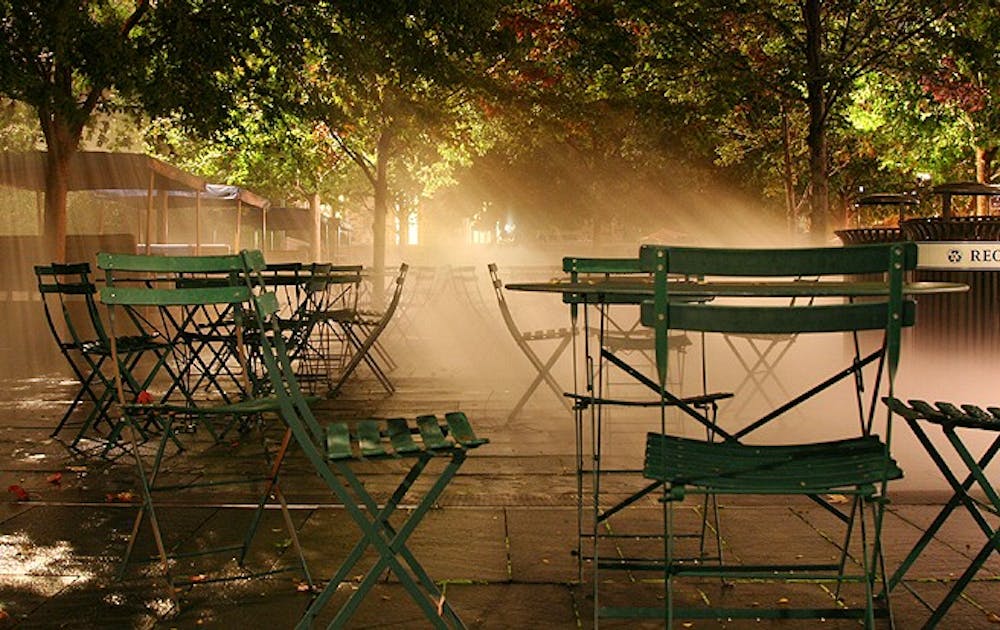One night during my first year, I called my mother in the middle of a breakdown. With tears rolling down my cheeks, I told her that a new mental illness was destroying my life, and that I felt utterly helpless to stop it. “I know how to be anxious, Mom. But I don’t know how to be depressed.”
I’ve been dealing with anxiety pretty much my whole life. I started going to therapy when I was fourteen, started taking meds when I was fifteen. And I can’t lie, it was horrible for a while—waking up in the middle of the night with sharp, twisting pains in your stomach, and then mediating the racing thoughts pounding at the walls of your skull every hour of the day.
But over time, I learned how to cope with my anxiety. I learned the things I could do when I was feeling extra anxious, like deep breathing, exercising, and journaling. Little by little, I started to feel in control again.
Depression is another animal entirely. When I fell into an intense depression my first year, I quickly realized that learning how to manage it wasn’t going to be as straightforward as before. Learning requires doing—and with depression, doing anything can become a challenge.
Before experiencing it myself, I had always perceived depression to be a form of chronic sadness. In reality, however, depression and sadness are not the same. Sadness tends to be circumstantial, and is usually remedied with time and tears. Sadness can be a symptom of depression, but the two are not synonyms.
Depression is heavy. It is the loss of all emotional energy and motivation, the loss of all feelings of purpose, desire, and pleasure. It is feeling removed from everyone in your life, including yourself. It is existing without living. Depression is nothingness.
Because I could barely muster the energy to even want to get better, I had no idea how I was going to overcome my depression, or at least recover enough to function normally. Getting over depression is incredibly hard. It’s like climbing out of a well with no rope, and no light except for the small patch of sunlight at the top. But, as I discovered, you can make your own rope, and you can build up the strength to pull yourself out.
When I decided to grit my teeth and get better, I knew I would have to force myself to do a lot of things that I really didn’t want to do. What I needed—interaction with the people I loved, good food, sunshine, movement, and a sense of accomplishment—was not what I wanted. What I wanted, or rather, what my depression wanted, was to stay in bed and dissociate from reality.
Instead, I threw myself headfirst into reality. I was determined to experience the fullness of life, even when my body screamed that life wasn’t worth living. I savored my food, watched the rustling of leaves in the wind, and listened to the lilting laughter scattered across the BC plaza. Over time, I started to feel real again. I started to feel again—joy, pain, passion, all of it.
Most of all, I needed to feel love, and I needed to feel loved. So I turned to my friends and family. I went to places I knew my friends would be and forced myself to sit there while they coaxed me out of my shell. I called my parents almost every day and listened to them telling me they loved me. I started to realize that their happiness mattered more to me than my depression ever could.
Finally—and this was the kicker—I realized I had to give that same love to myself. It felt idiotic at first, telling myself I liked the way I looked in the mirror even when I didn’t, feeding myself empty praises, and repeating cheesy affirmations over and over. But as ridiculous as I thought those practices were, they became the most important part of it all. When I actively loved the people and the world around me, I could feel content. When I loved myself, I could feel happy.
Now I’m happier than I’ve ever been. And let me tell you—happiness is criminally underrated.
If you’re reading this amidst feelings of hopelessness, I want you to know that you are not alone. But more than that, I want you to know that even if you think you’re a lost cause, you will never be too far gone. You might be depressed to varying degrees your entire life, and that’s okay. It may just be your neurological predisposition. But that doesn’t mean your mental illness is entirely beyond your control. Learning to manage your depression is painstaking and tedious, but it possible–and it is more than worth it.
Rebecca Torrence is a Trinity sophomore. Her column usually runs on alternate Wednesdays.
Get The Chronicle straight to your inbox
Signup for our weekly newsletter. Cancel at any time.

